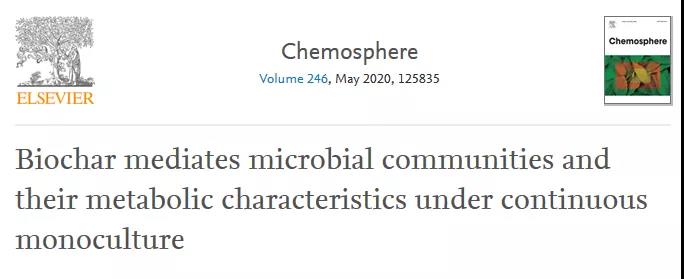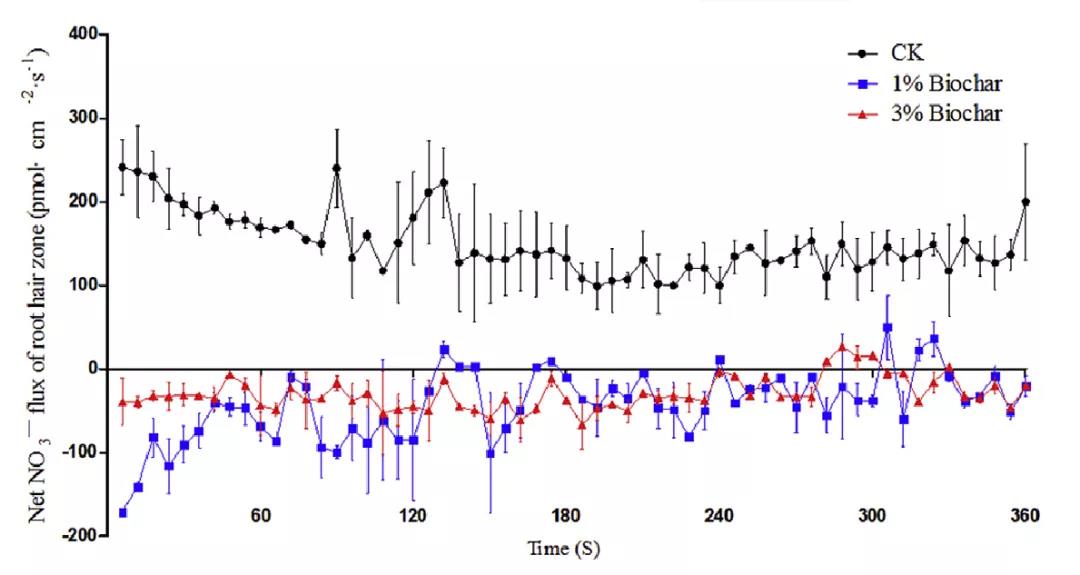转自“中关村NMT联盟”
NMT作为生命科学底层核心技术,是建立活体创新科研平台的必备技术。2005年~2020年,NMT已扎根中国15年。2020年,中国NMT销往瑞士苏黎世大学,正式打开欧洲市场。

研究使用平台:NMT中药材生长生理创新科研平台
期刊:Chemosphere
主题:生物炭介导微生物群落极其代谢特征
标题:Biochar mediates microbial communities and their metabolic characteristics under continuous monoculture
影响因子:5.108
检测指标:NO3-、NH4+、Na+、Ca2+、H+流速
检测样品:太子参
NO3-流实验处理方法:
0%、1%、3%(w/v)生物炭处理12小时
NO3-流实验测试液成份:
0.1mM NaCl,0.1mM CaCl2,0.1 mM NH4NO3,pH 6.0
作者:福建农林大学林文雄、林生、吴红淼
中文摘要(谷歌机翻)
生物炭改良剂已被广泛用于改善植物性能并抑制单一栽培系统中的病害。然而,很少有研究集中在再植疾病的基本控制机制上。
在这项研究中,我们评估了生物炭在连续单培养系统中对pseudo菜植物生长,根际土壤微生物群落以及微生物生理特性的影响。我们发现生物炭的添加对假单胞菌组织培养的生理参数影响不大,但在不同连续单培养年的根际土壤中能显着介导微生物的丰度,从而导致病原性尖孢镰刀菌,Talaromyces helicus和科萨科尼亚糖精。
此外,生物炭改良剂对有益细菌的生长具有不利影响,例如,伯克霍尔德氏菌,绿假单胞菌和短小芽孢杆菌。代谢组学分析表明,生物炭在抑制菌丝体生长和减轻植物的毒力的同时,显着影响了尖孢镰刀菌的代谢过程。
总而言之,这项研究详细说明了生物炭刺激的根际细菌和真菌的丰度和代谢变化,病原体含量减少以及植物生长环境条件改善的潜在机制。需要进一步的研究来评估生物炭在长期现场试验中的作用。
Steady state measurements of net fluxes in the meristematic zone of R. pseudostellariae under biochar treatment. CK, 1% biochar and 3% biochar represent the control with no biochar, 1% biochar and 3% biochar (w/v) added to the tissue culture media of R. psedostellariae for 12 h each, respectively. Data are mean ± standard deviation (n ¼ 5).

联盟推荐抗疫产品之一:新冠肺炎干细胞治疗NMT创新平台
英文摘要
Biochar amendment has been extensively used to improve plant performance and suppress disease in monoculture systems; however, few studies have focused on the underlying control mechanisms of replanting disease.
In this study, we assessed the effects of biochar application on Radix pseudostellariae plant growth, rhizosphere soil microbial communities, and the physiological properties of microorganisms in a consecutive monoculture system. We found that biochar addition had little impact on the physiological parameters of tissue cultures of R. pseudostellaria but did significantly mediate microbial abundance in the rhizosphere soil of different consecutive monoculture years, leading to decreases in the abundance of pathogenic Fusarium oxysporum, Talaromyces helicus, and Kosakonia sacchari.
Furthermore, biochar amendment had negative effects on the growth of beneficial bacteria, such as Burkholderia ambifaria, Pseudomonas chlororaphis, and Bacillus pumilus. Metabolomic analysis indicated that biochar significantly influenced the metabolic processes of F. oxysporum while inhibiting the mycelial growth and abating the virulence on plants.
In summary, this study details the potential mechanisms responsible for the biochar-stimulated changes in the abundances and metabolism of rhizosphere bacteria and fungi, decreases in the contents of pathogens, and therefore improvements in the environmental conditions for plants growth. Further research is needed to evaluate the effects of biochar in long-term field trials.
